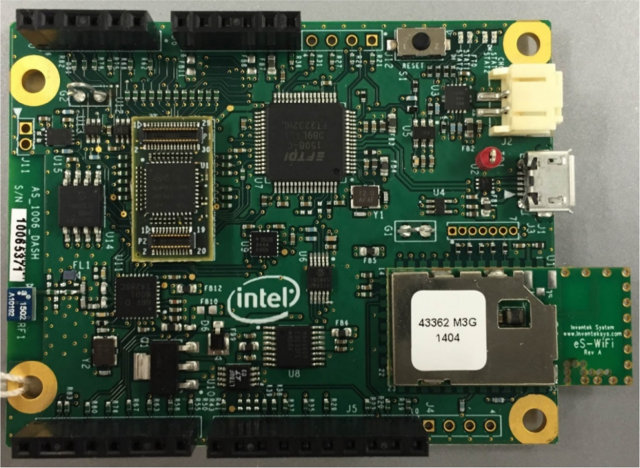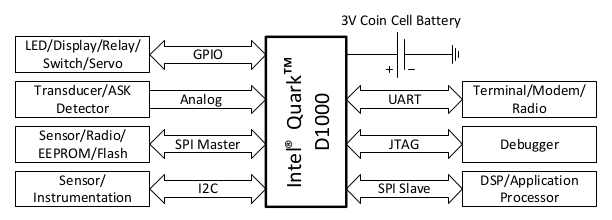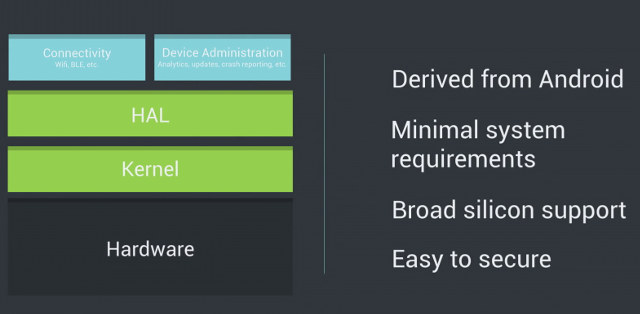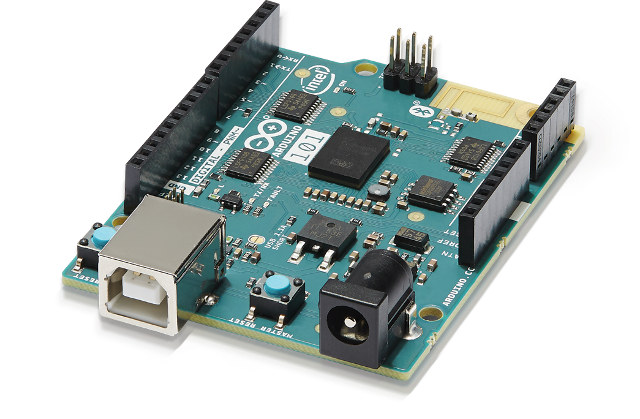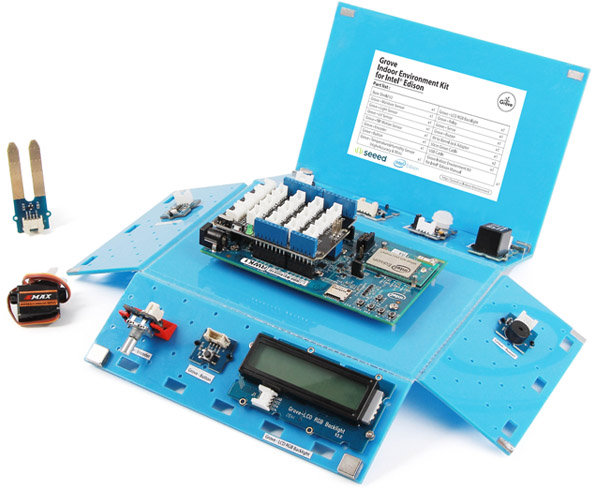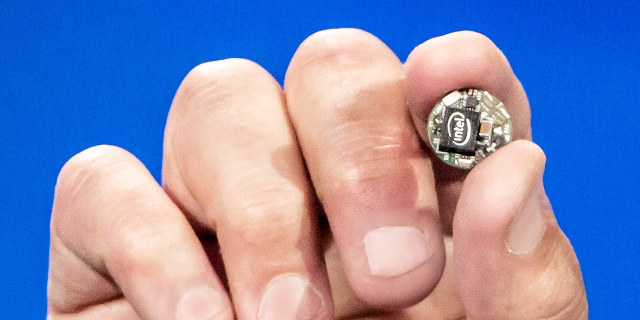Intel unveiled Intel Quark D1000, D2000 and SE micro-controllers last week, with Intel Quark D1000 available now for $2.5 to $4 depending in quantities, and to my knowledge the first Intel MCU that can be considered ultra low power. I could not see a development board at the time, but Intel does have an Intel Quark D1000 Customer Reference Board with a familiar Arduino form factor. Intel Quark D1000 board specifications: MCU – Intel Quark D1000 32-bit CISC micro-controller @ 32 MHz Storage – 4MB SPI flash (Microchip ) Connectivity – Bluetooth LE radio, Wi-Fi (Inventek Systems Serial to Wifi module) Sensor – 3-axis accelerometer Expansion – Arduino compatible headers with GPIOs, I2C, SPI, UART, analog inputs, and 5V, 3.3V and GND. Debugging – mini USB port for programming and debugging; JTAG pins Power – 5V via mini USB port, or LiPo / Li-ion battery Dimensions – N/A Information about […]
Intel Unveils Three New Micro-controllers for IoT: Quark D1000, Quark D2000, and Quark SE
Intel’s subsidiary, Wind River, has recently announced two operating systems for the Internet of things with Rocket RTOS and Pulsar Linux supported respectively by Quark MCUs, and Intel Atom processors, as well as some ARM SoCs. But it’s not the only “IoT” announcement made by Intel in the last week, as I found out via EETimes that the company also unveiled three new Quark SoCs, namely Quark D1000, and Quark D2000, and Quark SE. Intel Quark D1000 Contrary to previous Quark processor and the upcoming D2000 and SE processors, D1000 is not compatible with x86 instructions set, and features the following: 32-bit Harvard CISC CPU @ 33 MHz with single cycle barrel shifter, two cycle multiplier, multi-cycle divider, integrated 32-bit timer, programmable interrupt controller, and JTAG debugger. 128-bit wide 32 kB code flash and 8 kB ROM 32-bit wide 8 kB SRAM and 4 kB data flash Osciallators 20-33 MHz […]
Wind River Introduces Free Cloud-based Operating Systems for IoT Applications
After Google Brillo operating system was officially launched last week, another company has announced free operating systems for IoT. What’s peculiar is that the company is Wind River a vendor of commercial operating systems whose typical business model is to sell licenses for their operating systems and fees for their development services. Nevertheless, the company has now introduced Wind River Rocket real-time operating system, and Wind River Pulsar Linux operating system. Both OSes will interface with the company’s Helix Cloud software-as-a-service (SaaS) products, which is probably how the company intends to monetize their work, on top of customization services. Wind River Helix App Cloud is currently made of three products: Helix App Cloud cloud-based development environment for building IoT applications Helix Lab Cloud cloud-based virtual hardware lab for simulating and testing IoT devices and complex systems. Helix Device Cloud cloud-based platform for managing deployed IoT devices and their data. Some […]
Brillo Android based OS for IoT Projects Supports ARM, Intel and MIPS Platforms
You’d think there are already enough lightweight operating systems that could provide a good enough platform for IoT and embedded projects, but Google decided to make their own Brillo operating system for IoT, based on Android, most probably to leverage the existing Android tools, and make it easier for app developers to move to the Internet of Things space. Brillo ‘s hardware requirements are pretty low as the operating system can run on devices with 32MB of RAM, and 128MB of storage. Google will provide a complete ecosystem with an embedded OS, core services, and a developer kit with tools to build, test, and debug. Just like in Android, three architectures will be be officially supports, starting with the following hardware platforms: ARM – TechNexion Pico-i.MX6UL system-on-module based on Freescale i.MX6 UltraLite and Broadcom BCM4339 802.11ac + Bluetooth 4.0 wireless module, combined with PICO-DWARF baseboard. MIPS – Upcoming MIPS Creator […]
Arduino 101 Board Features Intel Curie Module, Bluetooth LE, and Sensors
I’ve recently learned that the battle between the two Arduino teams, namely Arduino SRL (arduino.org) in Italy, and Arduino LLC (arduino.cc) in the US, had taken another turn with Arduino LLC now branding their boards as Arduino in the US, and Genuino in the rest of the world. This may certainly bring confusion to new comers, especially as they have to deal with different version of the Arduino IDE. With that backdrop, Arduino LLC has now introduced Arduino 101 (aka Genuino 101) board powered by Intel Curie module with Quark SE x86 SoC with Bluetooth LE and a 6-axis combo sensor. Arduino 101 specifications: SoC – Intel Curie compute module including an Intel Quark SE x86 32-bit microcontroller @ 32 MHz and an a DSP sensor hub @ 32Mhz with 384 KB flash, 80 KB SRAM (24KB available for sketches), , Bluetooth LE, and 6-axis combo sensor with accelerometer and […]
Seeed Studio Introduces Automation and Wearable Kits for Intel Edison
Intel Edison is a $50 module with a dual core Atom processor @ 500Mhz and a single core Quark MCU @ 100 Mhz, Wi-Fi and Bluetooth 4.0, as well as headers for I/Os that’s destined to be used in wearables and IoT applications. Seeed Studio has now launched two kits for the Intel module for home automation and wearables. Grove Indoor Environment Kit for Intel Edison The automation kit comes in a small blue box with the following parts (Intel Edison and baseboard not included): 1x base shield v2 that plugs into Edison baseboard and allows Grove modules connections 11 grove modules – temperature & humidity, LCD RGB backlight, relay, moisture sensor, servo, light sensor, buzzer, UV sensor, PIR motion sensor, encoder and button. 2x 26 AWG Grove Cables 9V to barrel jack adapter 1x USB cables 1x User guide Programming is done with Edison Arduino IDE as explained in […]
Linux 4.0 Release – Main Changes, ARM and MIPS Architectures
Linus Torvalds “Ima Sheep” released Linux Kernel 4.0 on Sunday: So I decided to release 4.0 as per the normal schedule, because there really weren’t any known issues, and while I’ll be traveling during the end of the upcoming week due to a college visit, I’m hoping that won’t affect the merge window very much. We’ll see. Linux 4.0 was a pretty small release both in linux-next and in final size, although obviously “small” is all relative. It’s still over 10k non-merge commits. But we’ve definitely had bigger releases (and judging by linux-next v4.1 is going to be one of the bigger ones). Which is all good. It definitely matches the “v4.0 is supposed to be a_stable_ release”, and very much not about new experimental features etc. I’m personally so much happier with time-based releases than the bad old days when we had feature-based releases. That said, there’s a few […]
Intel Curie Board Designed for Wearables is Powered by Quark SE SoC
Intel announced the Edison board at CES 2014, a board targetting wearables and IoT applications about the size of an SD card. At CES 2015, the company has gone smaller, by unveiling the button-sized Intel Curie module powered by a new Intel Quark SE SoC with a motion sensor, Bluetooth Low Energy connectivity and battery charging capabilities. Intel Curie specifications: Low-power, 32-bit Intel Quark SE SoC 384kB Flash memory, 80kB SRAM Low-power integrated DSP sensor hub with a proprietary pattern matching accelerator Bluetooth Low Energy 6-axis combo sensor with accelerometer and gyroscope Battery charging circuitry (PMIC) The module runs an unnamed open source RTOS, and the company will provide IQ software kits for references applications for wearables, such as counting steps, apps for mobile device, and so on. Intel Curie is expected to be found in smart products such as rings, bags, bracelets, pendants, fitness trackers and buttons. There’s basically no […]


